Young and raring to work abroad: Why these Gen Zers and millennials left for different shores
Sign up now: Get ST's newsletters delivered to your inbox
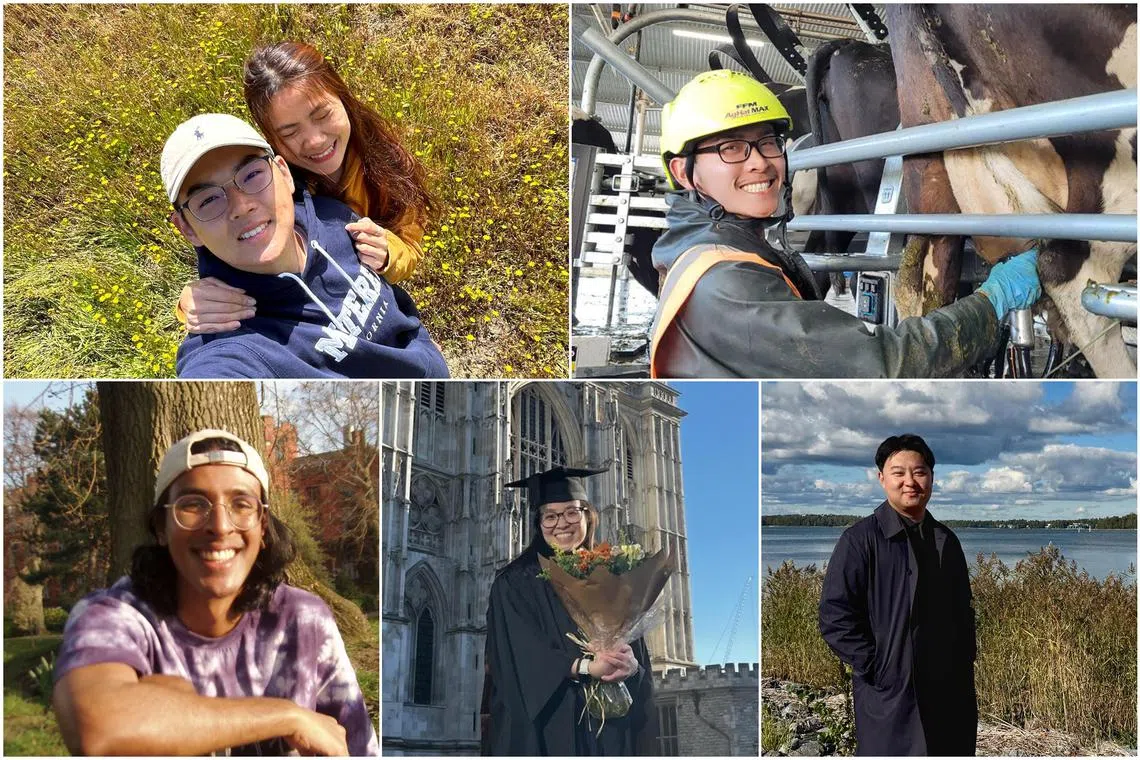
These Singaporeans share why they decided to say goodbye to Singapore early in their careers – and what would convince them to come back.
PHOTOS: COURTESY OF ASHER KUA AND EVELYN TEO, ZANDER LEE, SAMUEL QUEK, KIMBERLY WONG, SHASSHEN L
SINGAPORE – For Singaporean couple Asher Kua and Evelyn Teo, it was an easy decision to pack up their lives and move across the globe to California.
The Gen Z couple, both aged 25, relocated to the Golden State to work as chefs because the pay is easily double what they would have made in equivalent entry-level roles in Singapore restaurant kitchens.
However, salary was not the sole draw for this culinary couple seeking out different shores.
“The pay is a bonus,” says Mr Kua, who adds that working in California means more exposure, a better work-life balance and a chance to live more independently than others in his age group.
Both of them work in fine-dining restaurants in Northern California – he is a commis chef at Single Thread Restaurant & Inn and she a pastry chef at Cyrus Restaurant.
“For me, it still feels unreal that we’re doing this,” says Mr Kua, who studied product design at Ngee Ann Polytechnic before graduating from Culinary Institute of America in Singapore (CIA) in 2024.
Ms Teo, an alumna of Nanyang Polytechnic who graduated from CIA in the same year, says: “We’re working in well-known restaurants, living a life away from the city and living around wineries and farms where we can see how the produce is grown. We look up at the night sky and see the stars every night.”
The two landed their gigs through CIA’s externship programme. While they have not ruled out returning to Singapore eventually, they say their priority is building their careers in the US first.
This is a sentiment shared by many Gen Z and young millennial Singaporeans, according to a JobStreet survey
According to the Department of Statistics, the Singaporean diaspora, or number of overseas Singaporean citizens, is about 215,300 as at June 2024.
And this sentiment cuts across professions and qualifications. From picking up a working holiday visa for New Zealand to buying an air ticket to Finland without securing a job first, these Singaporeans share why they decided to say goodbye to Singapore early in their careers – and what would convince them to come back.
Saying no to hustle culture
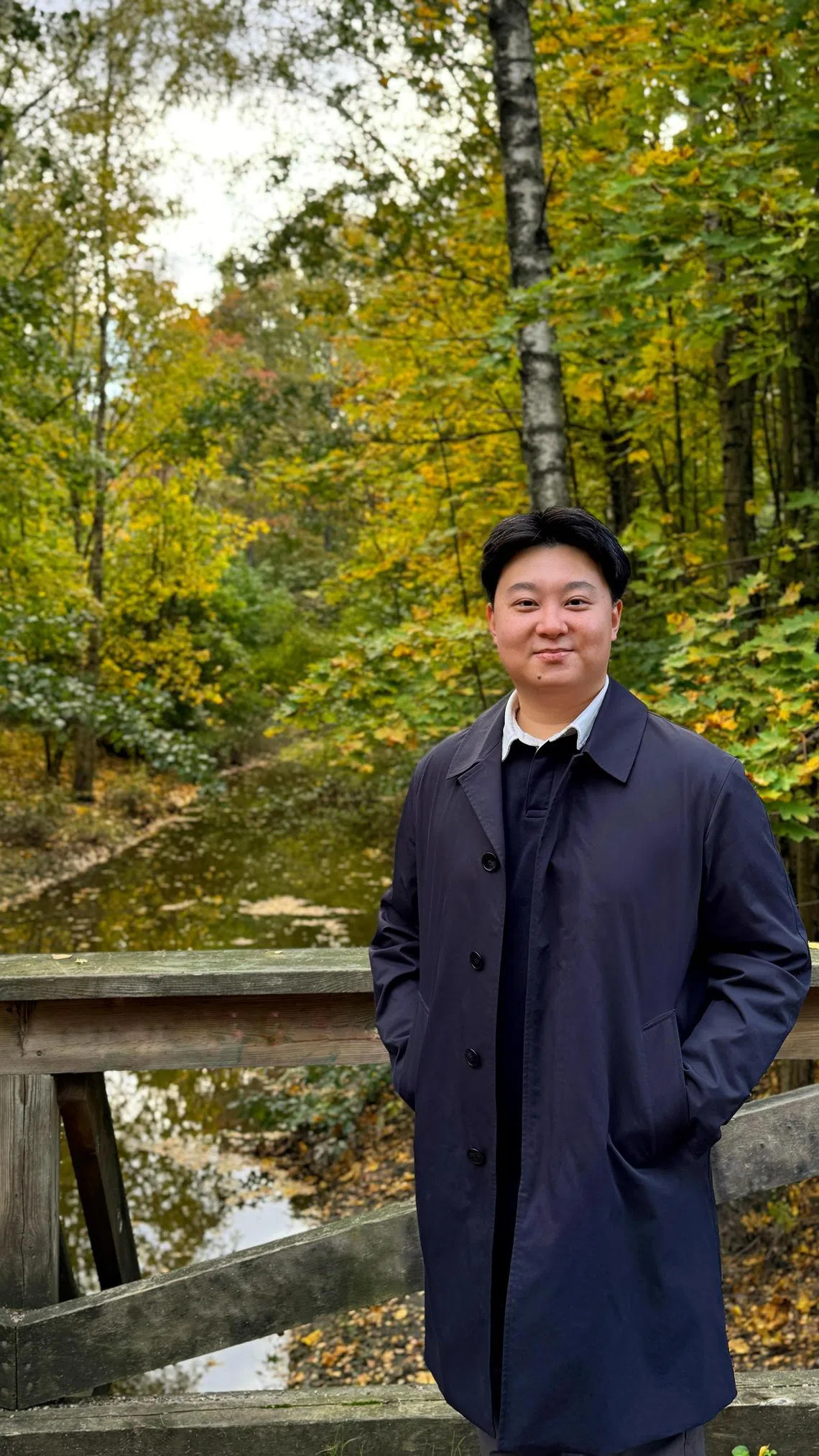
Mr Samuel Quek bought his flight ticket for Finland without first securing a job there. Three years on, he says the gambit has paid off.
PHOTO: COURTESY OF SAMUEL QUEK
Mr Samuel Quek, 28, first fell in love with Finland in 2019 during a three-month working stint in Lapland, the country’s northernmost region popular for its breathtaking views of the Northern Lights.
He worked as a marketeer and photographer for tourism agencies there, while pursuing an international relations degree with the Singapore Institute of Management. He became struck by the Finnish work culture, high trust given to employees, flat hierarchy and openness to alternative views in the workplace.
In 2021, he packed up and bought a one-way ticket to Helsinki without securing a job beforehand, planning to pound the streets to find one. It paid off when he landed a job as a brand marketing specialist three months later and obtained his residence permit.
He now works at a small software development company based in the capital city.
Mr Quek says his salary is similar to that of a fresh university graduate in Singapore, save for the 17 per cent income tax he pays on it.
Some of his job perks include a strictly-enforced 37.5-hour work week, five weeks of annual leave and frequent business travel to other countries within the European Union.
“People take work-life balance very seriously here, but it doesn’t mean things are less efficient or slower-paced,” says the bachelor. “There’s a lot more flexibility. When someone needs to leave, they leave. There’s an understanding that they have commitments outside of work, and that’s okay.”
In contrast, looking back on his time working in marketing in Singapore, he notes that people got ahead mainly by sacrificing personal and family time.
A survey by job portal Indeed published in September found that 93 per cent of Singapore employees surveyed worked beyond their official hours, with nearly a quarter indicating that they always did so.
Living in Finland, Mr Quek says he appreciates starting the workday feeling more rested after eight hours of sleep, and the ability to make appointments after work – such as meeting friends at the theatre – and keep them.
Work-life balance is just one part of the equation, however.
Mr Quek also values the “kampung spirit” that he has found in Helsinki, where the elderly frequently post their requests for assistance with things like moving furniture on Facebook, and community members happily help out.
“Where I live is near the coast,” says Mr Quek, who rents a studio apartment in Espoo, 30 minutes away from Helsinki’s city centre, for €1,000 (S$1,400) a month.
“When I’m just heading to the metro station, I have to walk past this little forest. I often stop and appreciate everything surrounding me – the nature, the smell, the sound, the colour of leaves in autumn. In Finland, they call it ruska, which translates into autumn foliage – and it has these really beautiful and vibrant colours.”
These quiet pleasures are a contrast to Singapore’s big-city vibe and constant noise, no matter the time of day.
The sense of serenity and wonder has made it hard for Mr Quek to leave – he has not returned to Singapore in the three years since he left. Though he says he will always be proud to be Singaporean and is close to his family here, he adds that it will take the right opportunity for him to consider coming back.

Chef couple Asher Kua and Evelyn Teo say they collectively save up to US$7,000 each month in their current jobs, a far higher rate than what they would be able to amass in Singapore.
PHOTO: COURTESY OF ASHER KUA AND EVELYN TEO
The gentler pace of living is also a key draw for chef couple Mr Kua and Ms Teo.
“They care a lot about human rights here,” Ms Teo says.
Mr Kua adds: “Singapore is just hustle, hustle, hustle.”
Labour laws in California stipulate that employees cannot work more than 12 hours a day, and overtime is duly compensated. While compliance can sometimes be lax – many occasionally work a half-hour more than they should – it is shorter than the 14-hour shifts they routinely pulled as junior chefs in restaurant kitchens in Singapore.
“The industry in Singapore, especially when you’re new, is that they let you do all the ‘sai kang’ (Hokkien for menial work),” Ms Teo says. “But over here, they give you more exposure and responsibilities.”
She adds that her workplace takes interns and trainees out to farms to get familiar with produce and provides cooking masterclasses every Sunday. Learning how to prepare a changing array of seasonal ingredients is a learning opportunity less easily found in Singapore.
Ms Teo works a four-day week, while Mr Kua does a five-day one, which involves 12-hour shifts a day and between eight and 12 days off a month.
The couple live in a one-bedroom apartment rental, which costs them US$2,300 (S$3,000) a month, in Healdsburg, about an hour’s drive north of San Francisco.
Collectively, they make just over US$10,000 a month between them, with their income exempt from tax under their current visa type.
They keep expenses low by cooking at home and getting free meals at work. Their biggest monthly expense is car insurance and fuel, amounting to about US$500.
There is also the matter of which professions are valued – or not – by Singapore society at large that keeps them away.
“The biggest thing that makes me not want to go back is how there are not as many opportunities for me back home, especially since Singaporeans don’t recognise chefs as much,” says Ms Teo, who points to the preoccupation with affordable eats in the Republic, instead of decent compensation for workers.

Mr Asher Kua and Ms Evelyn Teo say living a more rural existence, where they can see the stars in the night sky, has made it hard to contemplate leaving California.
PHOTO: COURTESY OF ASHER KUA AND EVELYN TEO
Ms Teo and Mr Kua say they arrived at their current calling after studying engineering and design in polytechnic respectively, which they felt pressured to pursue instead of their true passion in culinary arts. But in the end, their hearts won.
“Maybe our generation is starting to recognise chefs, but older generations think it’s nothing,” says Ms Teo, who adds that California’s fine-dining scene has more to offer for those starting out in their careers.
Although the pair dream of one day opening their own eatery in Singapore and are currently attempting to get a Build-To-Order (BTO) flat, they plan to continue with their Californian lifestyle in the interim, so they can live more freely and independently.
In Ms Teo’s words: “We will definitely go home one day, but the pay is good here. If we go home now, the pay is c**p. So why go home?”
More room to grow overseas
Beyond better work-life balance and pay, another prized aspect by young Singaporeans is living in a society that welcomes differences and does not judge those with heterodox views and aspirations.
Ms Kimberly Wong, 29, moved to London in 2022 to pursue a master’s degree in arts administration and decided to settle down in the city she had fallen in love with.
The vibrancy of the city’s cultural and creative industries was the main draw. She now works as a fund-raiser for the National Theatre of Great Britain.
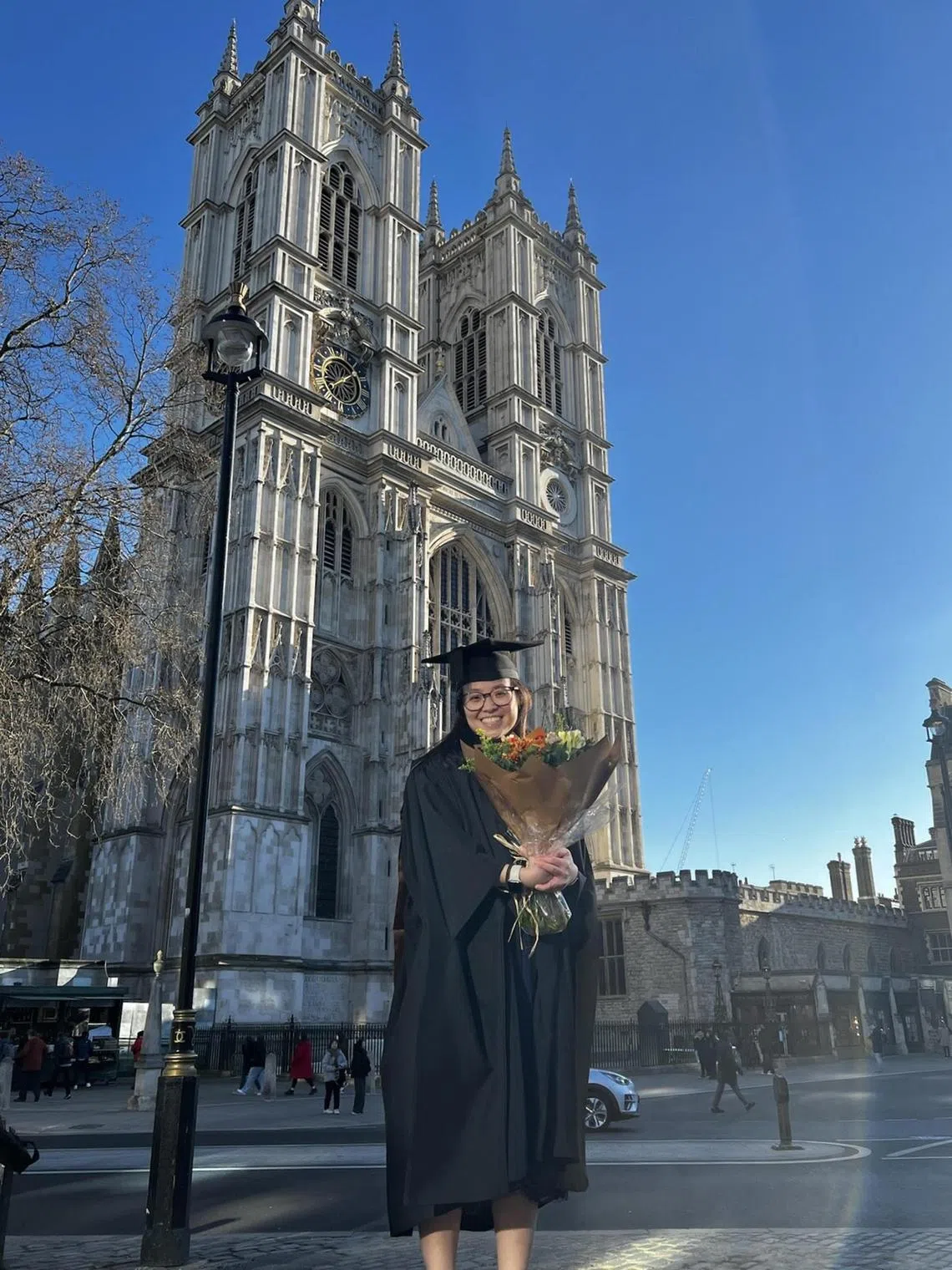
Ms Kimberly Wong says avoiding the pressure to marry and BTO was a key reason for moving abroad.
PHOTO: COURTESY OF KIMBERLY WONG
Carving out a similar career would be challenging in Singapore, where the arts is not seen as a viable or legitimate career path.
“I can be myself here in a way that I don’t have to keep chasing the Singaporean norm of having a ‘useful job’,” says the Nanyang Technological University graduate who majored in linguistics.
Another important factor is an environment that is less focused on conformity.
“There’s the whole Singaporean ideal of having to BTO, settle down and have babies. I’m 29, and most of my friends are successfully on that trajectory. But I wasn’t, and it was very isolating and suffocating,” Ms Wong adds.
When asked what needs to change in Singapore for her to return, Ms Wong says her family is reason enough to move home. But she adds that she hopes her country will gradually place less emphasis on conforming to “optimal” paths and lifestyles.
“I think pigeonholing young adults is only going to harm them,” she says, pointing to the societal fixation with optimal subject combinations and safe career choices. “We need to learn how to take risks.”
On this, tech worker Aiden Low concurs. “The thing I struggle with is the ‘No U-Turn Syndrome’ (Nuts).”
Nuts, a term coined by the late founder of Creative Technology Sim Wong Hoo
Nuts forms part of a long-held critique by many entrepreneurs against Singapore’s tech and start-up ecosystem, where compliance and rigidity are said to stifle innovation.
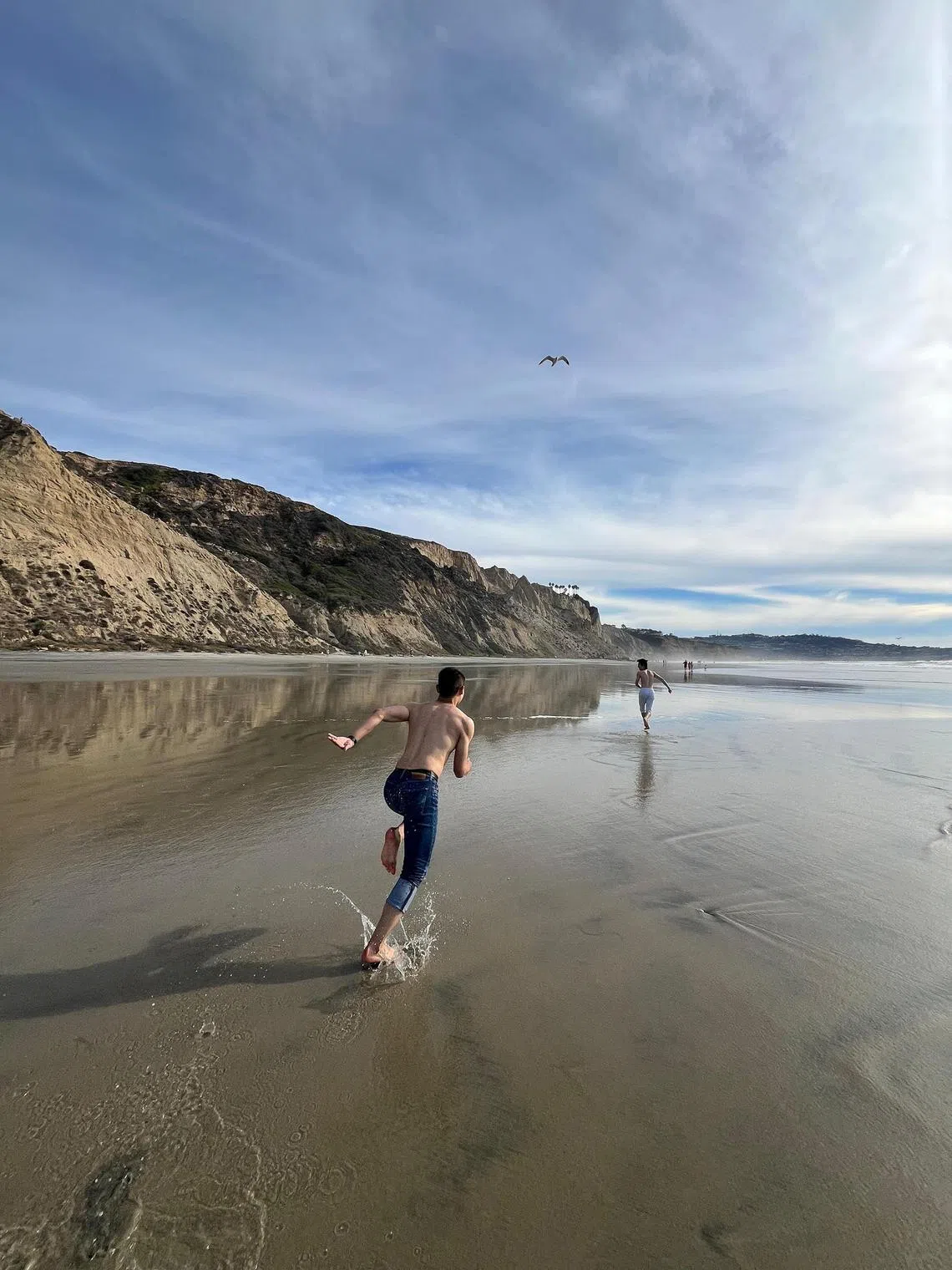
Mr Aiden Low says his decision to move to San Francisco was not just because of the tangible career benefits of its tech ecosystem, but also the intangible things that Singapore falls short on.
PHOTO: COURTESY OF AIDEN LOW
Mr Low, 27, says Singapore’s still-nascent start-up scene is part of the reason he made the move to San Francisco in 2022, where he works as a researcher at an artificial intelligence (AI) company.
“I would not be able to do the work I’m doing now in Singapore. We don’t have the same talent, compute (computational power) or venture capital funding.”
The National University of Singapore (NUS) computer science graduate, who previously interned at Facebook and Nvidia, says: “The US has its issues, I don’t think it’s as caring or as kind of a society. But it’s really nice to see people living different ways of life here.”
For example, he points to higher pay for those working in start-ups and general societal support towards those looking to make their own ideas a reality outside of established institutions.
As someone looking to make a global impact, he says he enjoys opportunities to rub shoulders with internationally acclaimed professors who pioneered key concepts in AI, and working on major product releases at his company.
He notes that new major products – from tech giants headquartered in the US like Google and Meta – are not typically worked on by employees based in Singapore.

Mr Aiden Low believes Singapore’s “no free lunch” mentality can breed a mercenary approach among younger generations, who feel less of a sense of attachment to their home country.
PHOTO: COURTESY OF AIDEN LOW
It is not just the greater room there for his career to grow. Mr Low also appreciates the diversity and ease of finding “people that accept you for who you are” in the US.
“There’s a lot more space to be quirky here. There’s a sense of ‘Oh, you’re just like that, it’s fine’ when it comes to differences.”
However, Mr Low emphasises that he still loves Singapore and will not rule out coming home because of his strong connection to his home country.
“I grew up on financial aid in Singapore – Edusave bursaries and every single financial aid option available in NUS for exchanges and normal semesters,” he says.
“So, I do think I could not have got to where I am without growing up in Singapore, coming from my family background.
“But it’s just not where I can see myself developing my career right now,” he adds.
In his view, younger Singaporeans’ strong sense of “What’s in it for me?” when choosing where to work and live may suggest that many like him now have weaker emotional ties to their home country, even though they maintain strong ties with family and friends in Singapore.
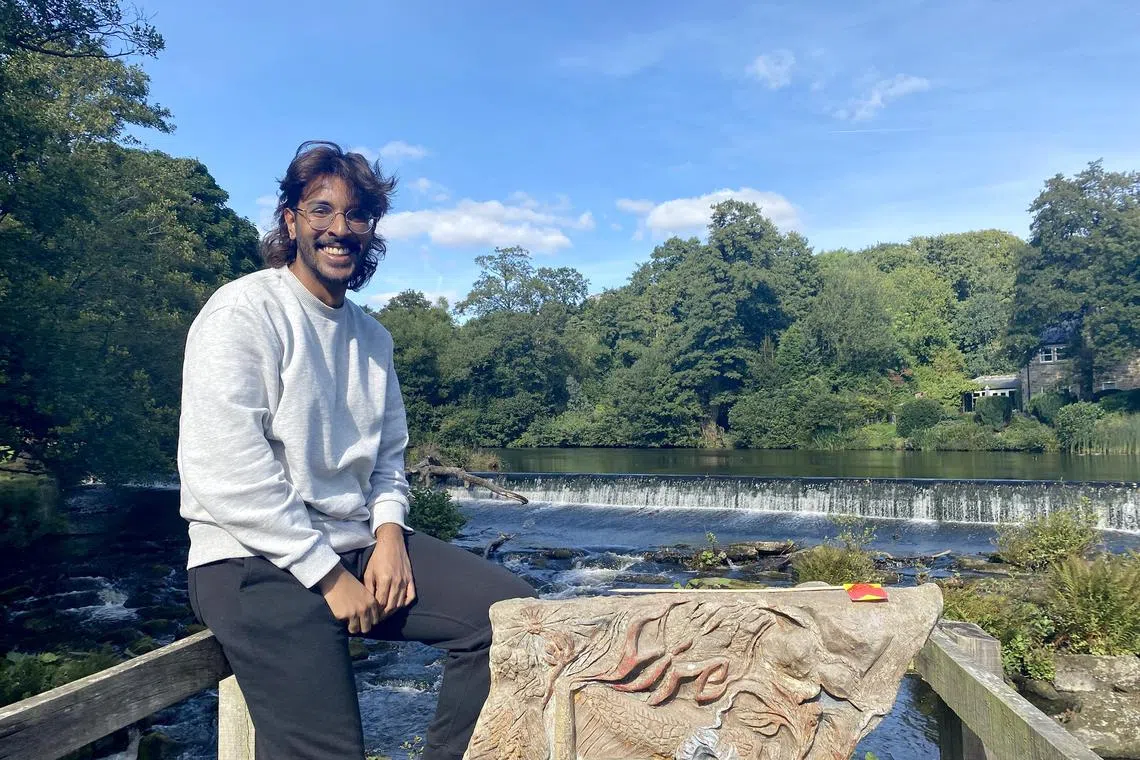
Mr Shasshen L says he is making the move to Britain because he feels it is a place where he can live more authentically, both in the workplace and outside of it.
PHOTO: COURTESY OF SHASSHEN L
But for one young Singaporean, matters of the heart are why he is making the move elsewhere, says Mr Shasshen L, 24.
Currently residing in Singapore, he is set to make the move to Britain in November to take up a job as an orthoptist (eye specialist).
The University of Sheffield graduate first went there in 2021 to pursue his undergraduate studies, and says his work placements there convinced him it was the right environment for him.
Although work-life balance and the ability to see more complex cases due to Britain’s larger population were key pluses for making the move, the more important factor was that he does not see a future for someone like him in Singapore.
He identifies as LGBTQ and says: “I wouldn’t be able to get married here if I wanted to.”
He adds that he is also fearful of the consequences of being open about that in the workplace.
“There’s the off-chance that someone might view me differently at work,” he says. “Obviously, that may not always be the case and I know many people in Singapore who are very open and supportive, but I’d rather not risk it.”
In contrast, in the UK, he says: “I don’t feel a need to hide who I am at work. The difference it makes to my mental health has been immense.”
Why not today?

Mr Zander Lee took up a working holiday visa in New Zealand at the age of 20, and counts skydiving, milking cows and living out of his car on road trips among key highlights of his time there.
PHOTO: COURTESY OF ZANDER LEE
While most young Singaporeans have – with imitable efficiency – taken various well-charted paths to establish themselves abroad, whether through internships, externships or extending their stay after studying abroad, one option provides a quicker, more footloose and fancy-free route for those who do not want to wait.
Countries like New Zealand offer working holiday visas, allowing young workers to fill labour gaps while experiencing life abroad.
This was the option taken by Mr Zander Lee, 22, who used a working holiday visa to move to New Zealand in March 2023 after national service.
Though he had initially planned to stay only three months, before returning to Singapore to begin studying at NUS, he wound up giving up his place to stay on for one year – the maximum duration allowed by his visa.
That year was spent working a wide variety of odd jobs – milking cows on a dairy farm, picking fruit at an orchard and setting up rides for a travelling carnival.
“Coming from a city, I really enjoyed using my hands and body to work,” he reflects. “It made me appreciate the hard work that farmers do so we can have our milk.”
His working holiday meant he did not need to tap his savings, as he made enough to get by from his minimum-wage jobs, where he earned about NZ$22.70 (S$18) an hour. His largest expense was rent, which typically cost him around NZ$200 a week for a room in shared lodgings.
What left the greatest impression was the lifestyle and people he met along the way. He was able to save up to buy a second-hand Suzuki Swift car for around $3,000, which gave him the freedom and flexibility to travel across New Zealand.
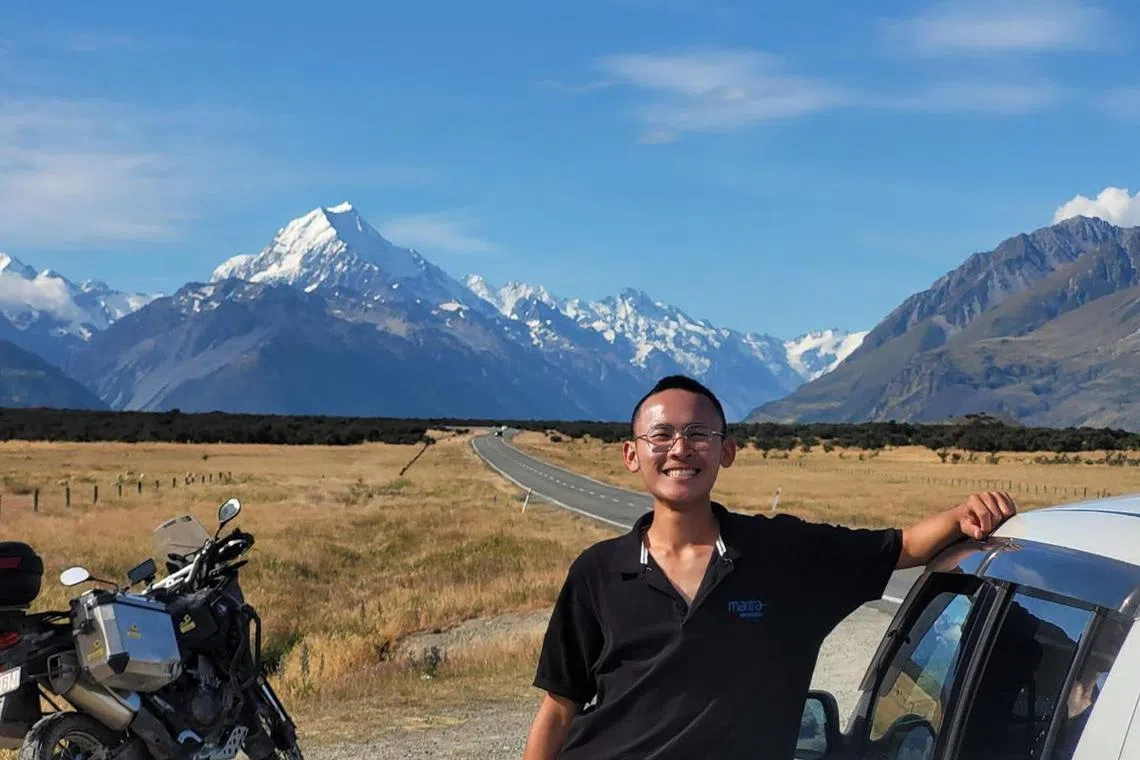
Mr Zander Lee says he does not regret his time abroad, even if it meant starting university later than most of his Gen Z peers.
PHOTO: COURTESY OF ZANDER LEE
“I saw the Southern Lights, went skydiving between New Zealand’s tallest mountain and its west coast and spent four days away from civilisation in the mountains,” he says. “People there know how to live life.”
For Mr Lee, a Victoria Junior College alumnus, the most meaningful aspect was the personal growth that came from life on the road.
“I had to find my own jobs to make a living, pay my rent, buy a car, pay for petrol, as well as many other living necessities and costs. I was living life a step at a time.”
Although he has since moved back to Singapore to read law at Singapore Management University, his mind frequently wanders back to his time in the mountains.
Mr Lee does not regret taking the year off to live abroad, even though it delayed his graduation, because of how it exposed him to a different way of life he now aspires to live.
“I have always been into sports and the outdoors. Being in Singapore, I would hear about people wanting to take it easy and maybe even retire on a farm in the countryside one day,” he says.
“To me, people kept saying, ‘One day, one day, one day.’ But that ‘one day’ would rarely come about. I thought to myself, ‘Why not make that day now?’”


